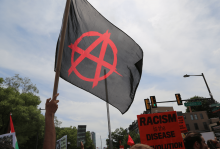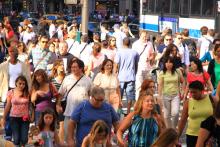systemic change

BEN WILDFLOWER IS a self-described “high-church lowlife.” He lives in Kensington, a Philadelphia neighborhood that’s also home to intravenous drug users and sex workers. Wildflower—the surname he and his wife adopted after their marriage—is white, bearded, and male; he grew up among conservative evangelicals but now attends an Episcopal church (“a wonderful, welcoming space for so many people alienated by the church,” he said, “but also a bizarre, bourgeois institution”). Sometimes he fixes his roommates’ bikes to cover rent; he aims to live on very little.
I came across Wildflower through his handmade religious prints that resemble the black-and-white woodcuts found in The Catholic Worker , albeit with a little more attitude: “O Mary conceived without white supremacy,” reads one of Wildflower’s prints featuring the Holy Mother using aerosol flamethrowers to destroy Confederate and Nazi symbols, “pray for us trying to dismantle this shit.”
Wildflower doesn’t love the word “anarchist” because it sounds too self-assured (“like how a super-duper Reformed person has answers for everything”) and often evokes scenes of white dudes eager to break stuff and punch cops. But he sticks with it: “I’m an anarchist because I oppose hierarchical power structures,” said Wildflower. “You apply it to sex and gender, you have ‘feminism.’ You apply it to white supremacy and racism, and you have ‘anti-racism.’ So what is it when you apply it to the modern state? I guess we don’t have a word better than ‘anarchism.’”
Does it bring joy?
IN THE PAST four years, it’s been tempting to believe the main problem with U.S. democracy is the current occupant of the White House and the electoral politics that paved his way to office. But Christian anarchists offer a different perspective.
“The thought of America crumbling should bring you joy,” Wildflower told me in an interview last spring. As Christian anarchists see it, the problems that exist in our nation—poverty, white supremacy, militarism, economic inequality, and on down the list—are not aberrations in an otherwise good system, but rather inescapable outcomes of any system where some people have been put in power over others. And as people of God, Christian anarchists feel called to dismantle these oppressive systems and create radical alternatives.
Take prisons: “I think people are valuable and shouldn’t be warehoused in cages,” said Wildflower. “I don’t think [prison] changes people; I don’t think it makes us safer; I think it’s a tool to control and impoverish communities of color. I want it to be destroyed.” Though he participates in what he calls “reformist” actions, such as voting for a better district attorney or advocating to change sentencing laws—something his younger anarchist self would have scoffed at, but that he felt was important after listening to women and people of color in his community—he doesn’t feel those actions will ever fix the underlying problem. “A system that holds people accountable for injustices looks so unimaginably different than the prison system, that I’m still totally on the ‘burn it down’ side.”
IN THE LAST YEAR of his life, Martin Luther King Jr. struggled with what are best understood as existential challenges as he began to move toward an ever-more-profound and radical understanding of what would be required to deal with the nation’s domestic and international problems.
The direction he was exploring, I believe, is far more relevant to the realities we now face than many have realized—or have wanted to realize.
I first met King in 1964 at the Democratic Party’s national convention held that year in Atlantic City—the occasion of an historic challenge by the Mississippi Freedom Democratic Party (MFDP) to the racially segregated and reactionary Mississippi Democratic Party. I was then a very young aide working for Sen. Gaylord Nelson of Wisconsin. Sen. Nelson authorized me to help out in any way I could despite President Lyndon Johnson’s effort to clamp down on the fight for representation in the interest of a “dignified” convention that would nominate him in his own right after his rise to the presidency following President Kennedy’s assassination. Johnson didn’t want a bunch of civil rights activists muddying the waters and, not incidentally, causing him problems in the conservative, race-based Democratic South.
After much back and forth, the Johnson administration offered a “compromise” proposal that the old guard be seated (provided they pledged to support him) and that two at-large representatives of the MFDP also be seated.

In the age of the internet, we have access to a vast quantity of information beyond our dreams even twenty years ago. Most of the time, I use this power to look at LOLCats and Buzzfeed articles like "11 Signs You Might be Dating a Pirate."
But as a Christian who feels the weight of caring for the people Jesus called "the least of these," I feel a responsibility to be educated about the plight of the billions of people who live on less than $2 per day around the world (and here in the US, as recently evidenced by the cuts to food stamp programs).
Caring for the poor directly in our neighborhoods is essential to the mission of the local church, and universally, it is the Church’s responsibility to care for the poor in every corner of the planet.